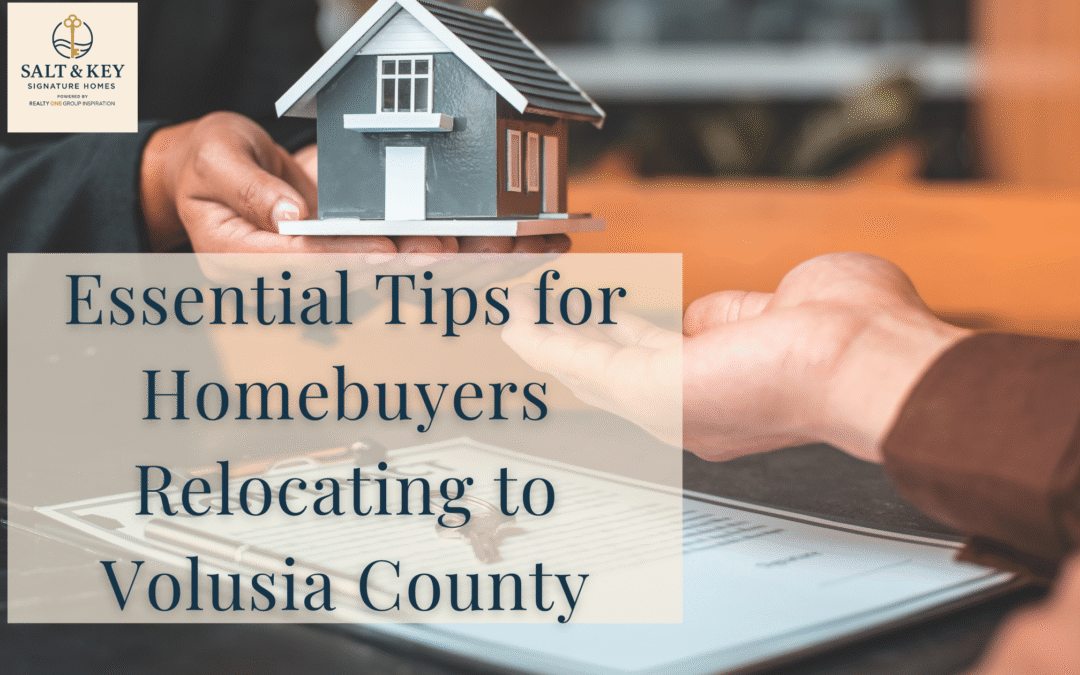- Understand the local housing market in Volusia County, including key factors like neighborhood dynamics, commute times, and future development potential.
- Prepare financially before relocating by reviewing your credit score, securing pre-approval, and estimating additional costs such as property taxes and insurance.
- Partner with a knowledgeable home builder to streamline your relocation, from selecting the right community to customizing your dream home.
Relocating to a new area is a major life decision—especially when it involves purchasing a home. For those considering a move to Volusia County, Florida, understanding the local housing market, lifestyle, and relocation process can make a world of difference. Whether you’re coming from out-of-state or just a few counties away, buying a home in this coastal region requires more than just finding the right property—it’s about making an informed, confident transition into a new community.
Let’s explore in-depth insights for homebuyers relocating to Volusia County, so you’re prepared to make smart choices before, during, and after your move.
Why Volusia County Is a Top Choice for Relocators
Volusia County, located along Florida’s Atlantic coast, has become a magnet for homebuyers seeking sun, space, and a balanced lifestyle. From the vibrant city of Daytona Beach to the quiet charm of DeLand and New Smyrna Beach, the area offers a diverse range of communities suited for young professionals, families, and retirees alike.
Population and Growth Trends
According to the World Population Review, Volusia County’s estimated population is 611,741 in 2025, marking steady growth fueled by both retirees and working-age individuals relocating from northern states. The area’s appeal is further strengthened by Florida’s no state income tax policy, relatively low cost of living, and expanding infrastructure.
Lifestyle Highlights
- Outdoor Living: 47 miles of coastline, extensive park systems, and the scenic St. Johns River.
- Accessibility: Proximity to I-95 and I-4 makes commuting to Orlando or Jacksonville feasible.
- Culture and Community: A mix of historic towns, art scenes, and annual festivals like Bike Week and Biketoberfest.
Understanding the Local Housing Market
Before making a move, it’s essential to understand the unique characteristics of the Volusia County real estate market. Like many parts of Florida, the region has seen fluctuations due to demand, interest rates, and new construction.
Median Home Prices and Trends
Inventory levels have stabilized compared to the post-pandemic housing surge, but competition remains strong in coastal areas and family-friendly suburbs.
Key Market Observations:
- Hot Zones: Daytona Beach Shores, Ormond Beach, and Port Orange are especially desirable for buyers looking for proximity to the coast and amenities.
- Affordability Pockets: Inland towns such as Deltona and DeLand often offer more square footage for the dollar.
- New Construction Growth: Planned communities are expanding in areas like Edgewater and Palm Coast, offering modern builds with HOA amenities.
Factors to Check Before Buying a Home in Volusia County

Relocating to a new area and purchasing a home is an exciting milestone, but it’s also a financial commitment that demands thorough preparation. Beyond selecting the right property, buyers need to understand the broader financial landscape that shapes the real estate experience in Volusia County. From insurance requirements to closing costs and tax considerations, each element plays a role in determining how comfortably and confidently you can move forward with your investment.
Financial Preparation Before the Move
Before starting your home search, it’s essential to assess your financial readiness through the lens of Volusia County’s real estate market. This means not only having a clear understanding of your budget but also accounting for the specific financial variables that come with owning property in Florida.
Securing mortgage pre-approval from a lender experienced in Florida transactions is critical. Volusia County includes both inland and coastal areas, and insurance costs—particularly for windstorm and flood protection—can vary significantly depending on the home’s location. Lenders who understand these regional nuances can offer better estimates and help you avoid delays or surprises during underwriting. Pre-approval also demonstrates to sellers that you’re a serious buyer, which is especially important in a competitive market.
Once pre-approved, review your long-term affordability beyond just monthly mortgage payments. Property taxes in Volusia County average around 0.94% of a home’s assessed value, but this can fluctuate depending on municipal rates and exemptions you may or may not qualify for.
Homeowners insurance is another key consideration. Florida’s unique climate and exposure to severe weather events mean insurance premiums may be higher than in other states, particularly if the property is near the coast or lacks modern storm-resistant features.
Closing costs should also be planned for well in advance. In Florida, buyers are typically responsible for a range of expenses that may include loan origination fees, title insurance, appraisal fees, and inspections.
In Volusia County, closing costs generally fall between 2% and 5% of the home’s purchase price, depending on the type of financing and local service providers. These costs are often overlooked until the final stages, so including them in your initial financial planning will help you stay within budget and avoid last-minute financial strain.
Another important factor is how relocation might affect your employment or income, especially if you’re moving from out of state. Lenders may require additional verification of income or job transfer documentation. If you’re self-employed or work remotely, be prepared to provide comprehensive financial records to establish loan eligibility.
It’s wise to prepare for unexpected costs post-move—whether it’s utility deposits, home repairs, or furnishing a larger space. Having a cash reserve beyond your down payment and closing costs will give you greater peace of mind as you settle into your new home.
Financial preparation isn’t just about what you can afford—it’s about ensuring your investment in Volusia County real estate supports your lifestyle and long-term goals. Taking the time to plan carefully now will set the foundation for a smoother, less stressful transition when you finally make your move.
Choosing the Right Neighborhood
Volusia County’s diverse geography offers something for every type of homebuyer, whether you’re looking for a vibrant beach lifestyle, a quiet suburban setting, or a historic small-town feel. Choosing the right neighborhood isn’t just about square footage or price per square foot—it’s about aligning your environment with your lifestyle, values, and long-term goals. Before making a purchase, it’s crucial to explore how different parts of the county vary in terms of amenities, pace of life, school systems, and even weather exposure.
For buyers prioritizing ocean views and easy beach access, communities like Daytona Beach Shores, Ormond Beach, and New Smyrna Beach are popular destinations. These areas offer a mix of high-rise condominiums, charming bungalows, and newer coastal homes.
They attract not only retirees and seasonal residents but also remote professionals and investors seeking vacation rentals. Living close to the Atlantic Ocean, however, often comes with higher insurance premiums and stricter building regulations, so buyers must weigh lifestyle benefits against cost implications.
Inland communities like DeLand, Deltona, and Orange City provide a different appeal. Known for their historic downtowns, shaded streets, and strong sense of community, these neighborhoods are favored by families and professionals who want more space, less congestion, and access to top-rated schools.
The cost of living is generally lower in these inland towns, and newer developments offer affordable homes with larger lots and modern amenities. Additionally, these areas are often at a reduced risk for flood-related issues, which can significantly impact insurance costs and property maintenance over time.
It’s also wise to consider long-term resale potential. Volusia County is growing, and investing in an area with future development plans—such as new schools, roadways, or commercial centers—can increase your home’s value over time. However, rapid growth can also lead to increased traffic and changing neighborhood dynamics, so understanding zoning plans and municipal development goals is an important part of the decision-making process.
Ultimately, the right neighborhood is one that supports your lifestyle today and continues to meet your evolving needs in the years to come. In a county as varied as Volusia, taking the time to explore your options thoroughly will ensure your relocation is both rewarding and sustainable.
Timing Your Purchase and Move
Timing your relocation can save money and reduce stress. Real estate markets in Florida often experience seasonal shifts, especially in popular coastal areas.
- Inventory tends to increase, and competition decreases as seasonal buyers step back.
- Avoid peak winter months, when out-of-state buyers drive demand and prices upward.
- Aim to move before hurricane season (June–November) peaks.
- Families’ time should move to align with school breaks to ease transitions.
Navigating the Homebuying Process from Afar
Buying a home is already a major undertaking—but when you’re doing it from another city, state, or even country, the process becomes significantly more complex. Long-distance buyers often face the challenge of making high-stakes decisions without physically being present. That’s why having a structured strategy and access to the right technology and professionals is essential.
Fortunately, today’s homebuying process has evolved to support remote transactions more effectively than ever before. Thanks to digital platforms, online communication tools, and knowledgeable local partners, you can now purchase a home in Volusia County without unnecessary delays, guesswork, or repeated travel.
Technology Is Your Friend
Technology plays a pivotal role in helping long-distance buyers evaluate, secure, and close on properties remotely. One of the most transformative tools for remote homebuyers is the virtual tour. High-definition video walkthroughs and 360-degree interactive tours allow you to explore homes as if you were there in person. These tours often go beyond just showcasing layout—they help you get a feel for natural lighting, finishes, yard size, and even neighborhood surroundings.
In addition to virtual tours, video conferencing platforms such as Zoom or FaceTime are commonly used for live walk-throughs with agents. These sessions offer the opportunity to ask real-time questions and request close-up views of specific features, giving you a personalized experience without setting foot in the property.
Once you’re ready to move forward with a purchase, e-signature tools such as DocuSign or Dotloop make it easy to securely sign offers, disclosures, and contracts from anywhere. These digital platforms are legally binding and widely accepted, ensuring that the paperwork side of your transaction moves swiftly.
Another key advancement is remote closing. Florida allows remote online notarization (RON), which means buyers can complete the final step of the process from their current location, whether that’s in another state or even abroad. This convenience has become especially valuable for relocators who are coordinating moves around jobs, school schedules, or cross-country logistics.
Work With Local Professionals
While technology is vital, it doesn’t replace the value of working with professionals who have boots on the ground in Volusia County. A trusted local real estate agent like Salt & Key Signature Homes can serve as your eyes and ears, providing critical context that online listings simply can’t capture. They can identify red flags, guide you on competitive pricing strategies, and provide insight into neighborhood dynamics that could impact your decision.
It’s also essential to work with a licensed home inspector familiar with Florida-specific concerns such as moisture control, roof life expectancy, and hurricane resistance. A thorough inspection report can uncover hidden problems before they become expensive surprises.
A local real estate attorney or title company helps ensure that zoning laws, permitting issues, or boundary disputes don’t derail your transaction. These professionals often handle the paperwork and filings necessary to legally transfer the property title, and they’ll ensure the closing complies with Florida regulations.
When these local experts work in tandem, they create a protective framework around your purchase—ensuring that nothing gets missed simply because you aren’t physically present.
Home Inspection and Insurance Must-Knows
Florida’s unique climate and regulatory environment mean that home inspections and insurance are not optional safeguards—they’re essential steps in protecting your investment. Volusia County, in particular, faces weather conditions such as high humidity, heavy rains, and potential hurricane threats, which require specific property features and precautions.
A comprehensive home inspection should assess every aspect of the structure’s condition and functionality. One of the most critical areas is the roof. In Florida, older roofs—especially those nearing 15 years of age—can present serious insurance challenges. Some insurers will refuse coverage unless the roof meets minimum standards for wind resistance, material type, and age.
HVAC systems must also be inspected closely. With high humidity and temperatures for much of the year, the cooling system must be efficient, well-maintained, and up to code. Replacing or upgrading HVAC components can be a significant unexpected cost if not addressed early.
Water damage and mold are concerns in Florida homes, even when they aren’t in designated flood zones. Your inspector should evaluate drainage systems, plumbing integrity, and any signs of interior moisture, especially in attics, basements, and bathrooms.
Given Florida’s susceptibility to hurricanes, hurricane mitigation features are another critical inspection point. Look for properties with impact-resistant windows, reinforced garage doors, hurricane shutters, and elevation certificates that confirm whether the structure is above base flood levels.
When it comes to insurance, standard homeowners policies in Florida often do not include windstorm or flood protection, especially in coastal areas. Windstorm coverage may be handled by a separate policy or the state-run Citizens Property Insurance Corporation. If the home is located in or near a floodplain, your lender may require flood insurance—even if FEMA maps don’t classify it as high-risk. Buyers should factor in these premium costs when budgeting for monthly housing expenses.
Your ideal Florida home is more than a purchase—it’s a foundation for the next chapter of your life. With the right insights and expert support, relocating to Volusia County can be smooth, rewarding, and exciting. Contact us at Salt & Key Signature Homes today to start your homebuying journey with confidence.

